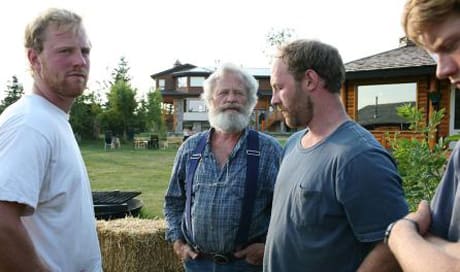Filmmaker David York thought he was going to talk to Wiebo Ludwig about his conviction and imprisonment, years earlier, for sabotaging natural gas wells near his northern Alberta home. When he got there, however, Ludwig was under suspicion for a new wave of bombings in the area. Ludwig was released after questioning, but he remains unrepentant for his earlier acts of civil disobedience, which he never outright admits to.
Ludwig is one of the most fascinating Canadian characters of the last 20 years, a conservative Christian who runs a self-sufficient family commune and became one of the only voices of resistance against the unstoppable oil and gas industries in Alberta. York, an atheist, had to plead to be welcomed into the Ludwig fold – no small feat, as the film's opening scene reveals. Yet Ludwig trusts York with the family's extensive video archives: over the years, they had filmed every encounter with the RCMP and documented the devastating effects that hydrogen sulphate leaks had on their livestock and, in one horrifying scene, their unborn children.
York's access to Ludwig comes at a price: there's nothing in this film that Ludwig, a controversial and complicated character, would find fault with; we don't hear from any of his many enemies. Ludwig became a pariah in the area, where people depend on the industry for jobs, and a fatally tragic incident on his farm with a local teenager didn't win him any sympathy.
But Ludwig makes a convincing case for the absurdity of the Albertan gas industry: the provincial government decreed that private landowners only have claim to the top six inches of earth and that anything underneath can be sold to gas companies, environmental consequences be damned.
Wiebo's War is a valuable look at Ludwig's struggle, but for a thorough journey into this story, it's hard to top Andrew Nikiforuk's 2002 Governor General's Award-winning book, Saboteurs.
(52 Media Inc.)Ludwig is one of the most fascinating Canadian characters of the last 20 years, a conservative Christian who runs a self-sufficient family commune and became one of the only voices of resistance against the unstoppable oil and gas industries in Alberta. York, an atheist, had to plead to be welcomed into the Ludwig fold – no small feat, as the film's opening scene reveals. Yet Ludwig trusts York with the family's extensive video archives: over the years, they had filmed every encounter with the RCMP and documented the devastating effects that hydrogen sulphate leaks had on their livestock and, in one horrifying scene, their unborn children.
York's access to Ludwig comes at a price: there's nothing in this film that Ludwig, a controversial and complicated character, would find fault with; we don't hear from any of his many enemies. Ludwig became a pariah in the area, where people depend on the industry for jobs, and a fatally tragic incident on his farm with a local teenager didn't win him any sympathy.
But Ludwig makes a convincing case for the absurdity of the Albertan gas industry: the provincial government decreed that private landowners only have claim to the top six inches of earth and that anything underneath can be sold to gas companies, environmental consequences be damned.
Wiebo's War is a valuable look at Ludwig's struggle, but for a thorough journey into this story, it's hard to top Andrew Nikiforuk's 2002 Governor General's Award-winning book, Saboteurs.
